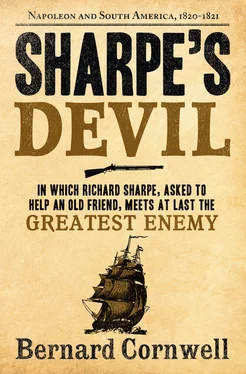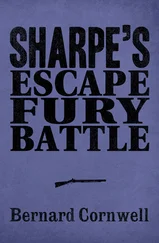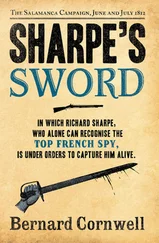The view was indeed spectacular. The window looked eastwards across the town’s thatched roofs, then beyond the shadowy foothills to the far snow-topped mountains. One of those distant peaks was pluming a stream of brown smoke to the south wind. ‘A volcano,’ Marquinez explained. ‘Chile has a number of them. It’s a tumultuous place, I fear, with frequent earthquakes, but fascinating despite its dangers.’ Marquinez’s servant brought cigars, and Marquinez hospitably offered a burning spill to Harper. ‘So you’re staying with Mister Blair?’ he asked when the cigars were well lit. ‘Poor Blair! His wife refused to travel here, thinking the place too full of dangers! Still, if you keep Blair filled with gin or brandy he’s a happy enough man. Your Spanish is excellent, permit me to congratulate you. So few of your countrymen speak our language.’
‘We both served in Spain,’ Sharpe explained.
‘You did! Then our debt to you is incalculable. Please, seat yourselves. You said you had a letter of introduction?’
Marquinez took and read Doña Louisa’s letter which did not specifically describe Sharpe’s errand, but merely asked any Spanish official to offer whatever help was possible. ‘Which of course we will offer gladly!’ Marquinez spoke with what seemed to be a genuine warmth. ‘I never had the pleasure of meeting Don Blas’s wife. He died, of course, before she could join him here. So very tragic, and such a waste. He was a good man, even perhaps a great man! There was something saintly about him, I always thought.’ The last compliment, uttered in a very bland voice, somehow suggested what an infernal nuisance saints could be. Marquinez carefully folded the letter’s pendant seal into the paper then handed it back to Sharpe with a courtly flourish. ‘And how, sir, might we help you?’
‘We need a permit to visit Puerto Crucero where we want to exhume Don Blas’s body, then ship it home.’ Sharpe, encouraged by Marquinez’s friendliness, saw no need to be delicate about his needs.
Marquinez smiled, revealing teeth as white and regular as a small child’s. ‘I see no extraordinary difficulties there. You will, of course, need a permit to travel to Puerto Crucero.’ He went to his table and riffled through his papers. ‘Did you sail out here on the Espiritu Santo?’
‘Yes.’
‘She’s due to sail back to Spain in a few days and I see that she’s ordered to call at Puerto Crucero on her way. There’s a gold shipment ready, and Ardiles’s ship is the safest transport we have. I see no reason why you shouldn’t travel down the coast in the Espiritu Santo and, if we’re fortunate, you might even take the body back to Europe in her hold!’
Sharpe, who had been prepared by Blair for every kind of official obstructiveness, dared not believe his good fortune. The Espiritu Santo could indeed solve all his problems, but Marquinez had qualified his optimism with one cautious word that Sharpe now echoed as a tentative query. ‘Fortunate?’
‘Besides the permit to travel to Puerto Crucero,’ Marquinez explained, ‘you will need a permit to exhume Don Blas’s body. That permit is issued by the church, of course, but I’m sure the Bishop will be eager to satisfy the Dowager Countess of Mouromorto. However, you should understand that sometimes the church is, how shall I say? Dilatory?’
‘We came prepared for such difficulties,’ Sharpe said.
‘How so?’ The question was swift.
‘The church must have charities dear to its heart?’
‘How very thoughtful of you.’ Marquinez, relieved that Sharpe had so swiftly understood the obstacle, offered his guests a dazzling smile and Sharpe wondered how a man kept his teeth so white. Marquinez then held up a warning hand. ‘We mustn’t forget the necessary licence to export a body. There is a disease risk, you understand, and we have to satisfy ourselves that every precaution has been taken.’
‘We came well prepared,’ Sharpe said dourly. The requirements, so far as he could see, were two massive bribes. One to the church which, in Sharpe’s experience, was always greedy for cash, and the other to the army authorities to secure the travel permit and for the licence to export a body, which licence, Sharpe suspected, had just been dreamed up by the inventive Marquinez. Doña Louisa, Sharpe thought, had understood Chile perfectly when she had insisted on sending him with the big chest of coins. Sharpe smiled at the charming Marquinez. ‘So when, señor , may we expect a travel permit? Today?’
‘Oh, dear me, no!’ Marquinez frowned, as though Sharpe’s suggestion of such haste was somehow unseemly.
‘Soon?’ Sharpe pressed.
‘The decision is not mine,’ Marquinez said happily.
‘Our affairs will surely not be of interest to Captain-General Bautista?’ Sharpe said with what he hoped was a convincing innocence.
‘The Captain-General is interested in all our visitors, especially those who have been notable soldiers.’ Marquinez bowed to Sharpe, whose fame had been described in Louisa’s letter of introduction. ‘Tell me,’ Marquinez went on, ‘were you at Waterloo?’
‘Yes.’
‘Then I am sure the Captain-General will want to meet you. General Bautista is an aficionado of the Emperor. He would, I think, be delighted to hear of your experiences.’ Marquinez beamed delightedly, as if a mutual treat awaited his master and Sharpe. ‘Such a pleasure to meet you both!’ Marquinez said, then ushered them back to the guardroom. ‘Such a pleasure,’ he said again.
‘So how did it go?’ Blair asked when they returned.
‘Very well,’ Sharpe said. ‘All things considered it couldn’t have gone much better.’
‘That means you’re in trouble,’ Blair said happily, ‘that means you’re in trouble.’
That night it rained so heavily that the town ditch flooded with earth-reddened water which, in the moonlight, looked like blood. Blair became drunk. He bemoaned that his wife was still in Liverpool and commiserated with Sharpe and Harper that their wives were, respectively, in France and Ireland. ‘You live in bloody France?’ Blair kept asking the question as though to dilute the astonishment he evidently felt for Sharpe’s choice of a home. ‘Bloody funny place to live, I mean if you’ve been fighting the buggers. It must be like a fox moving in with the rabbits!’
Sharpe tried to talk of more immediate matters, like Captain-General Bautista and his fascination for Napoleon, but Blair did not want to talk about the Spanish commander. ‘He’s a bastard. A son of a whore bastard, and that’s all there is to say about him.’ It was clear that Blair, despite his privileged status as a diplomat, feared the Spanish commander.
‘Are you saying he’s illegitimate?’ Sharpe asked disingenuously.
‘Oh, Christ, no.’ Blair glanced at the servants as though fearing they had suddenly learned English and would report this conversation to Bautista’s spies. ‘Bautista’s a younger son, so he needs to make his own fortune. He got his posting here because his father is a minister in Ferdinand VII’s government, and he greased his son a commission in the artillery and an appointment in Chile, because this is where the money is. But the rest Bautista did for himself. He’s capable! He’s efficient and a hard worker. He’s probably no soldier, but he’s no weakling. And he’s making himself rich.’
‘So he’s corrupt?’
‘Corrupt!’ Blair mocked the word. ‘Of course he’s corrupt. They’re all corrupt. I’m corrupt! Everyone here knows the bloody war is lost. It’s only a question of time before the Spaniards go and the Chileans can bugger up their own country instead of having someone else to do it for them, so what Bautista and his people are doing is making themselves rich before someone takes away the tray of baubles.’ Blair paused, sipped, then leaned closer to Sharpe. ‘Your friend Vivar wasn’t corrupt, which is why he made enemies, but Bautista, he’s a coming man! He’ll make his money then go home and use that money to buy himself office in Madrid. Mark my words, he’ll be the power in Spain before he’s fifty.’
Читать дальше












